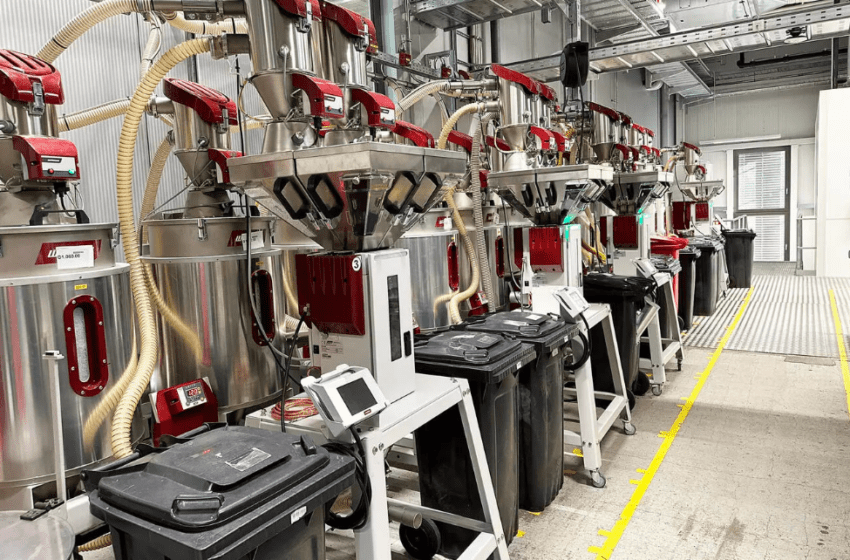
S-Max 2 Granulators from Wittmann Amortised Within only Six Months
|
Getting your Trinity Audio player ready...
|
More sustainability, creation of a circular economy, fluctuating raw material and energy prices – these current challenges are bringing in-house recycling of sprue and production scrap into focus. It pays off to check into which products regrind can be blended. A well-known manufacturer of electronic components has been able to cut unit costs in injection moulding production thanks to in-house recycling. The new S-Max 2 granulators from WITTMANN paid back their purchase price within just six months.
The processing company manufactures sophisticated electronic components on 15 injection moulding machines with clamping forces ranging from 15 to 120 tons. These include many different plugs and connectors for technical and industrial applications.
“We are using many of our products here ourselves”, explains the injection moulding department manager. “For example, in the injection moulding machines and robots. This is certainly a decision-making factor in choosing our suppliers”.
The most recently acquired machines on the company’s production floor – two servo-hydraulic SmartPower models – have come from WITTMANN. The energy efficiency of WITTMANN injection moulding technology was a further consideration in favour of choosing this equipment.
Blending in up to 25 per cent regrind
The cooperation with WITTMANN has already existed for many years, since in materials handling the processor also relies on solutions from Austria. WITTMANN supports every project with extensive know-how, counselling and solutions tailored precisely to fit the customer’s needs.
Nevertheless, the market is analysed thoroughly for each new project, and products from several different suppliers are always evaluated. Most recently, this was done two years ago, when the company decided to recycle sprue and production scrap in-house and return them to the injection moulding process.
For a long time, it was considered impossible for customers to accept a proportion of recycled material in their parts. But the current demand for a circular economy has prompted the industry to rethink this point. “We have carried out numerous tests with recycled materials and thoroughly analyzed the quality of the injection moulded parts”, explains the injection moulding department manager. “Many plugs have filigree structures with thin-walled areas. We had to make sure that we can fill the cavities completely and maintain the required product attributes with recycled material, too.”
The tests proved successful. The percentage of regrind which can be blended in with the virgin material was defined for each individual product. Up to 25 per cent is possible for parts produced at the company’s facility.
Easy grinding of parts with high fibreglass content
Sprue and production scrap such as start-up parts and rejects are now collected in boxes at the machines and brought to the new recycling center by the machine operators. This center is located in the middle of the injection moulding hall and consists of four brand-new S-Max 2 granulators from WITTMANN. A separate lattice box is placed in front of the granulators for each different variety and colour of the main material. Strict single-variety collection of scrap to be processed is an important prerequisite for producing high-quality parts from regrind.
The main materials include various types of polyamides as well as PBT, ABS and polypropylene, all flame retardant modified and mixed with fibreglass. Materials with very high fibreglass contents of up to 60 per cent are being processed.
As soon as a lattice box is full, one of the granulators is started. The recycling center is operated and supervised by the injection moulding staff. So, the overall responsibility lies in one hand.
Targeting homogeneous granulate
“We investigated several different granulators at the fair and carried out grinding tests with our own material at the respective suppliers”, explains the injection moulding department manager. “At WITTMANN’s technical lab in Nuremberg, the sprue from our plugs was ground on an S-Max 2 granulator. The result proved convincing. This granulator delivered a highly homogeneous granulate with grain diameters ranging from 3.5 to 4 mm, and the proportion of dust development was below that of other granulators we had tested.”
“The S-Max 2 screenless granulator series is designed for processing engineering plastics and parts which are hard to grind”, says Wolfgang Prütting, Regional Sales Manager at WITTMANN BATTENFELD Germany. The grinding tools have a long service life even with high fibreglass content.
Compact design and integrated sound insulation are further advantages showing their positive effect most distinctly when the granulators are not run in a separate room, but directly in the production hall instead.
Direct onward forwarding of granulate
S-Max 2 granulators come equipped with a filling level sensor as standard. As soon as the collecting container is full, the grinder stops. To enable continuous operation, WITTMANN has designed a special solution for this particular customer. Instead of switching off the grinder, the signal from the filling level sensor is used to switch on an integrated vacuum conveyor unit. In this way, the material is transported directly from the granulator’s collecting container into a material bin.
The bin is then passed on to the central materials handling system with a lot of dryers, material loaders and a coupling station located on the floor above the storage room. Forklifts are used to lift the bins filled with granulate to the upper level and there connected with Gravimax blenders – which have also come from WITTMANN. The gravimetric blending system enables gram-accurate metering of the granulate to be blended in with the virgin material.
Virgin material consumption significantly reduced
Since the start-up of the in-house recycling project, the consumption of virgin material has gone down continuously, with an immediate effect on unit costs to improve the manufacturer’s competitiveness. Most recently, several patents have expired, resulting in intensified competitive pressure. “Using recycled materials is our only way to achieve competitive unit costs”, says the processor. “The new granulators have already amortised themselves within only six months.”
Read more from Wittmann Battenfeld here.
Wittmann Battenfeld UK
01933 275777
Website






